The Big Blue Blimp Returns
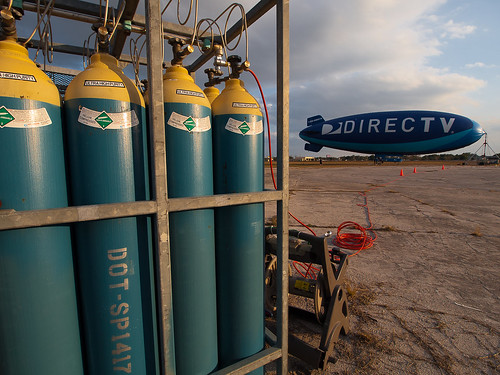 |
| "Helium Source" Olympus E-P2 with Zuiko Digital 9-18mm + DMW-MA1 1/500s, f/5.6, ISO 200, 9mm |
The DirecTV blimp returned to Orlando this morning. I saw it while driving to work. And for a brief instance, I saw it and the MetLife blimp moored side-by-side on the open field next to the Orlando Executive Airport. I should have exited the 408 right then and there and gone over to capture that moment, but I thought they'd both be there when I drove home after work. Unfortunately, MetLife left both airfield and Orlando not long after I'd driven past. Yet again, another of Life's Lessons: act quickly when the opportunity presents itself.
"Helium Source" was one of the last group of photos taken before I finished for the afternoon. The helium to the left is being fed, through the long orange hose snaking across the field, to the blimp.
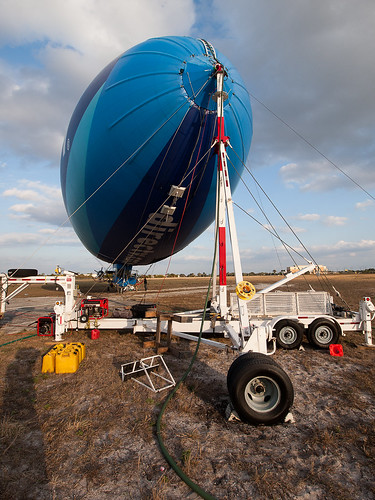 |
| "Mooring Mast and Blimp" Olympus E-P2 with Zuiko Digital 9-18mm + DMW-MA1 1/400s, f/6.3, ISO 200, 9mm |
The DirectTV is a much larger craft than the MetLife, and it shows in the scale of the gear used to service the blimp, such as this mooring mast. Compare the size and sophistication of the DirecTV's mooring mast with that used to service the MetLife blimp. The DirecTV mooring mast is built to be folded up for transport, and requires a fairly beefy truck (a Ford F-250 class) to haul it from field to field. It's weight and the fact it's pretty thoroughly tied down combine to create a strong anchor point. I've noticed it doesn't take much wind to push either blimp around and add considerable stress to the mooring mast in fairly light winds.
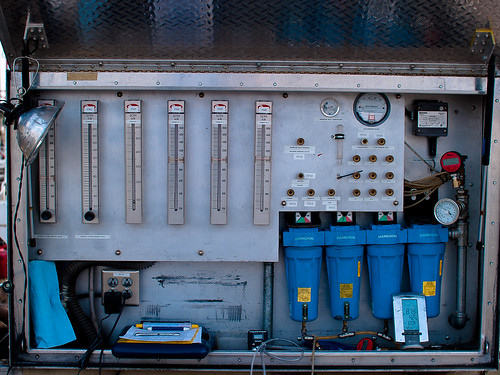 |
| "Helium Scrubber" Olympus E-1 with Sigma 30mm f/1.4 1/250s, f/3.2, ISO 100 |
An important piece of gear for any blimp is a helium scrubber. It pumps the helium out of the blimp, removes everything but the helium (especially water vapor) and pumps it back into the gas bag. Helium isn't manufactured so much as it's collected, usually as a byproduct of natural gas processing. Helium is mixed with natural gas, but is not chemically bound to it. To remove helium from natural gas (which raises the potential heat energy of natural gas), the natural gas goes through a number of cryogenic fractionation steps that eventually produces 99.99% pure helium, and lots of pure natural gas as well. When you combine a scarce industrial element, such as helium, with a work-intensive process, you create a very expensive raw material. So it literally pays to reuse (through scrubbing) the large volume of helium in the gas bag.
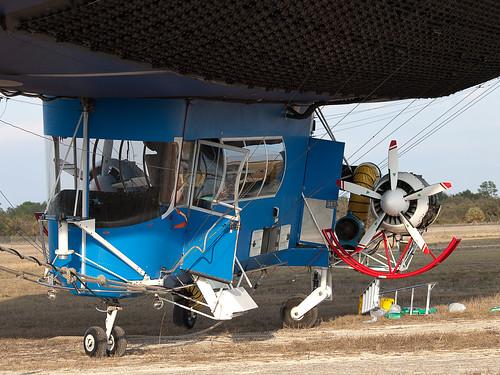 |
| "Control Car and Port Engine" Olympus E-3 with Zuiko Digital 50-200mm 1/250s, f/5.6, ISO 200, 69mm, -0.3 EV |
The control car and engines of the DirecTV blimp help to illustrate the larger size of this airship over the MetLife blimp. The engines are considerably larger in order to handle the larger craft. The control car is also proportionately larger, and contains the control system for the display mounted on the port side.
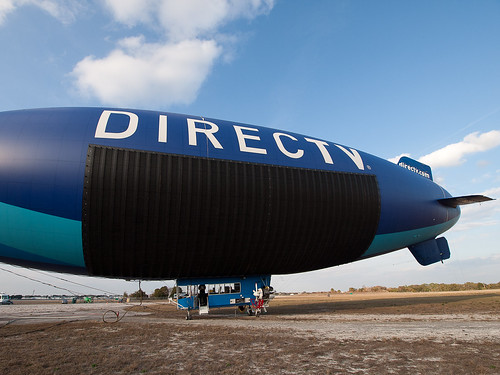 |
| "Blimp Display" Olympus E-P2 with Zuiko Digital 9-18mm + DMW-MA1 1/250s, f/7.1, ISO 200, 9mm |
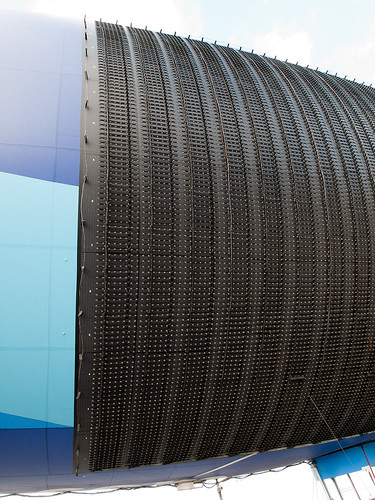 |
| "Blimp Display Detail" Olympus E-P2 with Zuiko Digital 9-18mm + DMW-MA1 1/40s, f/6.3, ISO 200, 11mm, -0.7 EV |
The display panel is built of individual lamps.
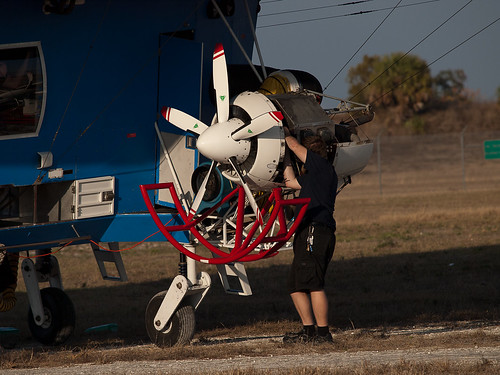 |
| "Working on an Engine" Olympus E-3 with Zuiko Digital 50-200mm 1/1250s, f/5.6, ISO 200, 200mm, -1EV |
It's interesting that a cage has been built around the lower third of the prop. Although I didn't ask explicitly, I would guess it's to protect the prop if the control housing "tips" towards the ground due to strong winds, especially on approach.
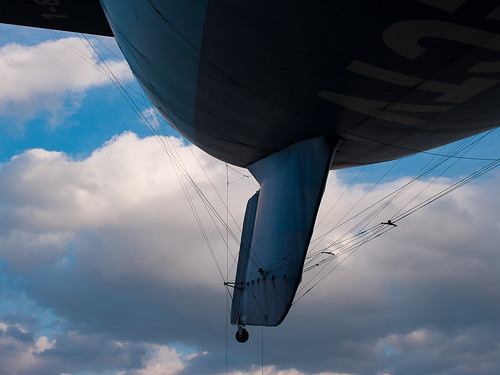 |
| "Ventral Fin and Rigging" Olympus E-1 with Sigma 30mm f/1.4 1/800s, f/4, ISO 100 |
Blimps are an interesting combination of the old and the new. In the photo above, the old is the use of rigging (using modern materials) to maintain the orientation of the ventral fin relative to the body of the blimp, as well as provide mechanical control of the ventral fin's stabilizer. The "little" wheel on the ventral fin duplicates the design of the MetLife's, and acts to protect the ventral fin in case it should drag the ground.
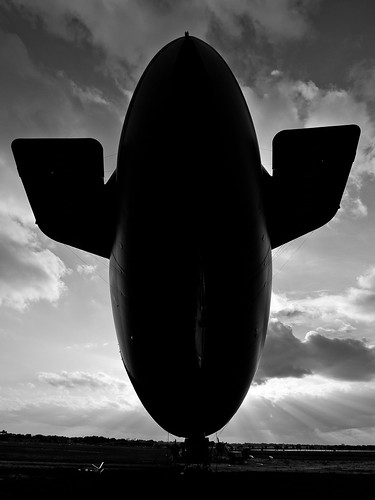 |
| "Sunset" Olympus E-P2 with Zuiko Digital 9-18mm + DMW-MA1 1/800s, f/6.3, ISO 200, 10mm, -1EV |
Regardless of their size, all airships are imbued with a certain magic, a magic that's share by all aircraft. Airships have a unique grace and beauty all their on.

Comments
Post a Comment
All comments are checked. Comment SPAM will be blocked and deleted.